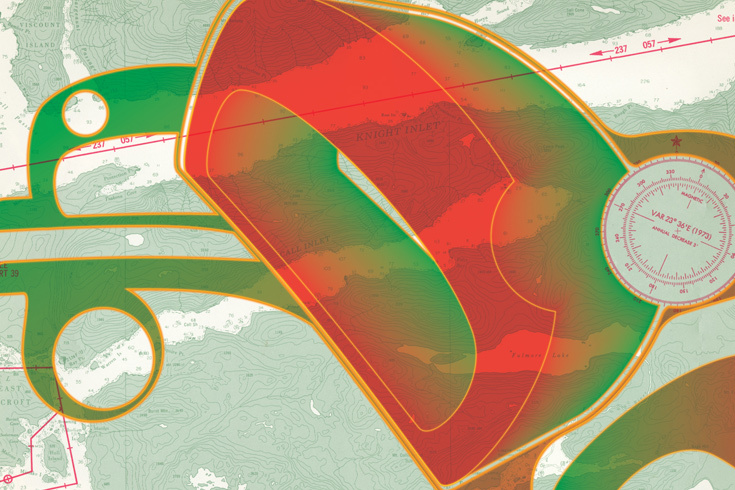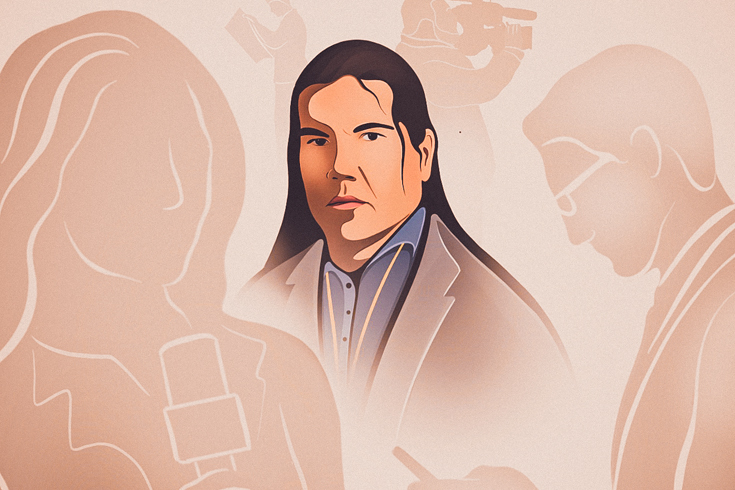
TERRA COGNITA
The Indigenous stories we would rather be telling
Editor’s Letter
What would our stories look like if, just for a little while, we stopped telling them for other people and instead told them for ourselves?
BY ROBERT JAGO
Another Indigenous man was shot and killed by police a few hours ago. He was the ninth Indigenous person to die at the hands of Canada’s police forces since COVID-19 reached the country in January. People were worried about what the coronavirus would do to reserve: as of today, Indigenous Services Canada reports that six people have died from COVID-19 on rez—a third fewer than have been killed by police or after police encounters.
Letter to a Young Indigenous Journalist
You will feel alone. You will want to give up. But I urge you to keep going
BY WAUBGESHIG RICE
ILLUSTRATION BY LUKE SWINSON
People will pronounce your name incorrectly. They’ll mistake you for another Indigenous reporter. You’ll be asked by clueless colleagues to pronounce words and names in an Indigenous language different from yours. You may be pressured to soften the blow of Canada’s colonial history so as not to offend white audiences. You will be told this is for the sake of “balance. That’s because these spaces weren’t created for you.”
Notes from an Apocalypse
In Jeff Barnaby’s latest horror film, the zombies are colonizers and only we are immune
BY CHELSEA VOWEL
PHOTOGRAPHY BY RED WORKS PHOTOGRAPHY
Self-described “rezzed out hillbilly” Mi’gmaq director Jeff Barnaby’s latest film, Blood Quantum, is a searing indictment of colonialism—and also a zombie flick, full of squelchy gore, chainsaws, machetes, and buckets of blood. As a massive wimp, I’ll admit I watched through my fingers at times, eyes pressed closed when scenes got particularly wet.
The Hungry People
Europeans like to go on about the innovations colonizers brought to the Americas. But what of the innovations they took away?
BY ROBERT JAGO
ILLUSTRATION BY MARIAH MEAWASIGE/MAKOOSE
There are maggots inside my gloves—this I discover after a few minutes of wear, when I get a prickly feeling in my fingertips. I quickly take the gloves off, flip them inside out, and rinse them in the river. I’m making my best effort at being tough and unflappable because I’m out with the Stó:lō fishing fleet, and fishers, as a rule, are tough.
Bloodlines
Sometimes a little vigilante justice is the sweetest revenge
FICTION BY ERIKA T. WURTH
ILLUSTRATION BY SEAN KATSENHAKERON DAVIDSON
“So let me get this straight,” I said, pausing to light a cigarette. I’d decided to take a break from my break from smoking. Something about being called in on a case in another country—one that, up until two days ago, I’d known only ambiguously as the origin of my deadbeat dad—had led me to it.
Header image The Paradise Syndrome, Voyage #36 (2016), by Sonny Assu (sonnyassu.com). Image courtesy of the artist.
"I inherited a set of spiral-bound navigation books from my grandfather, which are often used by mariners to plot their course of travel on the water. My grandfather didn’t have much use for them, mind you. He knew the waters of the inside passage like the back of his hand.
"Pre-contact, the Ligwiłda’xw, the Kwakwaka’wakw, and the other Pacific coastal First Nations once had full reign over their respective territories. As I looked over these charts, reliving my childhood on the water, I couldn’t help but think of what the government had left us and what harm that has done. Scanning the vast land and water base, I saw the origin place of the Ligwiłda’xw and was able to trace our move south. I saw where the Ligwiłda’xw once gathered food. Where the Ligwiłda’xw gathered in times of war, and in times of ceremony, with their neighbours. The coastal First Peoples once had vast networks of trade, communication, and kinship. In the end, the wave of colonialism relined Indigenous nations to the confines of imposed boundaries, only visible and enforceable by settlers with magic eyes."
Credits
Editor-in-chief Robert Jago (pun intended)
Supervising editor Hamutal Dotan
Art direction Meredith Holigroski
Digital production Angela Misri, Phil James
Editorial support Tajja Isen, Samia Madwar, Carmine Starnino
Head of research Erin Sylvester
Fact checkers Allison Baker, Sejla Rizvic, Nicole Schmidt, Amy van den Berg
Copy editor Jonah Brunet
The Walrus thanks David and Natasha Sharpe for generously supporting Terra Cognita and Indigenous storytelling.







